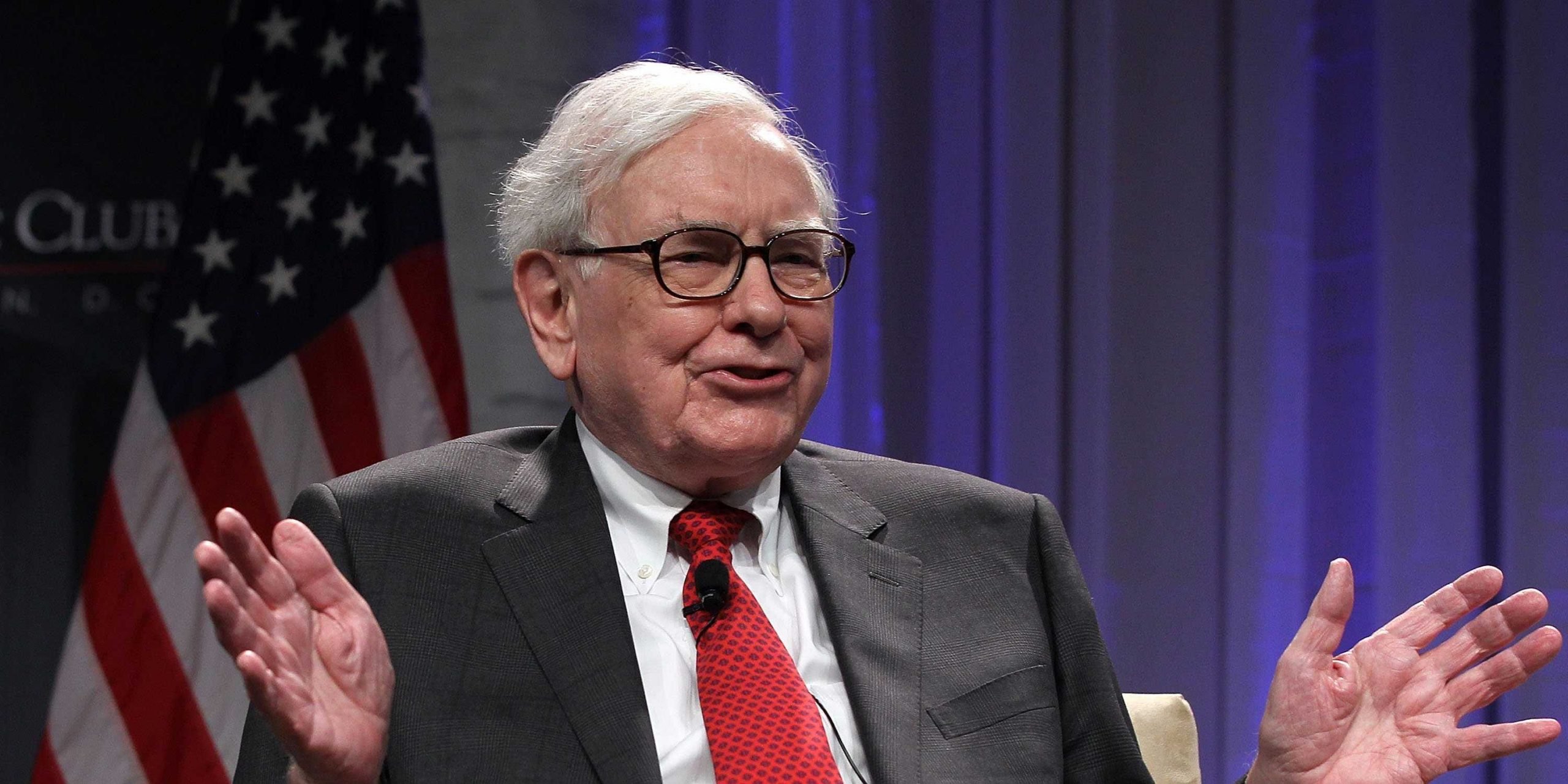- Warren Buffett, the chairman and CEO of Berkshire Hathaway, released his annual letter to shareholders on Saturday alongside the company’s fourth quarter 2019 earnings report.
- In the letter, Buffett discussed share buybacks, his death, and Berkshire Hathaway’s acquisition strategy going forward.
- Here are the biggest takeaways from the letter.
- Read more on Business Insider.
It’s an exciting day for Berkshire Hathaway shareholders and the broader investment community: Warren Buffett has released his annual letter to shareholders alongside the company’s fourth-quarter earnings report.
The letter, which Buffett has penned for decades, gives a glimpse into company operations, performance, and strategy, as well as an inside look into what the “Oracle of Omaha ” has been thinking about in the past year.
This year’s letter was 14 pages long and boasted quotes from economists such as Edgar Lawrence Smith and John Maynard Keynes. In it, Buffett lamented about the “fickle stock market,” “rare” opportunities for buying companies, and the role of boards of directors. He also discussed some plans for his and vice chair Charlie Munger’s death, and gave a hint about succession plans.
Buffett also exhibited his usual flourish for humor and wisdom in the letter. In discussing the attributes of a board of directors, he wrote, “if I were ever scheduled to appear on Dancing With the Stars, I would immediately seek refuge in the Witness Protection Program.”
He continued: "We are all duds at one thing or another. For most of us, the list is long. The important point to recognize is that if you are Bobby Fischer, you must play only chess for money."
In 2019, Berkshire Hathaway stock posted its worst underperformance of the broader market in a decade, and have gained 1.1% this year through Friday's close. Buffett again failed to make a major acquisition for Berkshire Hathaway. In the absence of a large company purchase, Berkshire Hathaway bought back a record $2.2 billion of its stock in the fourth quarter. Over the entire year, the company spent $5 billion on repurchasing its own stock.
The company posted net earnings of $29.2 billion in the year, up from a loss of $25.4 billion a year earlier when the company had to take a major write-down on its investment in Kraft Heinz Co. Operating earnings fell 23% in 2019 to $4.4 billion. Berkshire Hathaway's record cash pile was $128 billion at the end of 2019, down only slightly from $128.2 billion at the end of the third quarter.
Here are the main takeaways from Warren Buffett's annual letter to Berkshire Hathaway shareholders.
Accounting rules

The first letter of Buffett's report was dominated by his thoughts on GAAP accounting rules. In 2019, the company earned $81.4 billion, broken down into $24 billion of operating earnings, $3.7 billion of realized capital gains and a $53.7 billion gain from an increase in the amount of net unrealized capital gains that exist in the stocks we hold. Each of those components of earnings is stated on an after-tax basis.
The $53.7 billion gain comes from the GAAP accounting rule that went in place last year.
"As we stated in last year's letter, neither Charlie Munger, my partner in managing Berkshire, nor I agree with that rule," Buffett wrote.
He continued: "The adoption of the rule by the accounting profession, in fact, was a monumental shift in its own thinking. Before 2018, GAAP insisted - with an exception for companies whose business was to trade securities - that unrealized gains within a portfolio of stocks were never to be included in earnings and unrealized losses were to be included only if they were deemed "other than temporary." Now, Berkshire must enshrine in each quarter's bottom line - a key item of news for many investors, analysts and commentators - every up and down movement of the stocks it owns, however capricious those fluctuations may be."
Stock buybacks

Berkshire Hathaway's annual report, released the same day as the letter, showed that the company repurchased a record $2.2 billion of its own stock at the end of the year, up from $700 million in the previous quarter. That brings the total the company spent on stock buybacks to $5 billion over the year.
"Over time, we want Berkshire's share gown to go down," Buffett wrote. "If the price-to-value discount (as we estimate it) widens, we will likely become more aggressive in purchasing shares. We will not, however, prop up the stock at any level."
Berkshire Hathaway loosened its rule around share buybacks in 2018 making it easier for Buffett and Munger to authorize buybacks when the repurchase price is "below Berkshire's intrinsic value," according to the company. Still, in previous quarters, analysts thought that the company could've spent more on share buybacks.
Boards of directors

Buffett also discussed the compensation and purpose of corporate boards over the last few years, a "hot topic."
"Over the years, many new rules and guidelines pertaining to board composition and duties have come into being. The bedrock challenge for directors, nevertheless, remains constant: Find and retain a talented CEO - possessing integrity, for sure - who will be devoted to the company for his/her business lifetime. Often, that task is hard. When directors get it right, though, they need to do little else. But when they mess it up,......" he wrote.
He continued: "At Berkshire, we will continue to look for business-savvy directors who are owner-oriented and arrive with a strong specific interest in our company. Thought and principles, not robot-like "process," will guide their actions. In representing your interests, they will, of course, seek managers whose goals include delighting their customers, cherishing their associates and acting as good citizens of both their communities and our country."
Acquisitions

Buffett did not make a major acquisition in 2019, marking the third year in a row since Berkshire Hathaway has completed a company purchase. In this year's annual letter, he spelled out his three criteria for buying companies for shareholders and investors.
"First, they must earn good returns on the net tangible capital required in their operation. Second, they must be run by able and honest managers. Finally, they must be available at a sensible price," he wrote.
He continued: "When we spot such businesses, our preference would be to buy 100% of them. But the opportunities to make major acquisitions possessing our required attributes are rare. Far more often, a fickle stock market serves up opportunities for us to buy large, but non-controlling, positions in publicly-traded companies that meet our standards."
Succession plans

In this year's annual letter, Buffett told shareholders that Berkshire Hathaway is "100% prepared" for his death.
He also wrote that two key executives thought to be in the running to succeed him - Greg Abel and Ajit Jain- will be given more exposure at the company's annual shareholder meeting in Omaha, Nebraska.
This year, shareholders at the meeting will be able to address questions to Abel and Jain as well as Buffett and Munger, according to the letter.
"That change makes great sense. They are outstanding individuals, both as managers and as human beings, and you should hear more from them."
Buffett has been the CEO and chairman of Berkshire Hathaway since 1970. This week, Buffett became the longest-tenured CEO in the S&P 500 when Les Wexner at L brands stepped down.
Market performance

Buffett wrote that bonds will likely outperform stocks long-term, especially if interest rates and corporate taxes remain low.
"What we can say is that if something close to current rates should prevail over the coming decades and if corporate tax rates also remain near the low level businesses now enjoy, it is almost certain that equities will over time perform far better than long-term, fixed-rate debt instruments," he wrote.
He continued: "That rosy prediction comes with a warning: Anything can happen to stock prices tomorrow. Occasionally, there will be major drops in the market, perhaps of 50% magnitude or even greater," he said.
Buffett added that equities are "the much better long-term choice for the individual who does not use borrowed money and who can control his or her emotions. Others? Beware!"
Politics

Buffett notably did not discuss politics in this year's shareholder letter, a departure from last year's letter where he spoke about how bipartisanship has spurred prosperity in the US.
Buffett campaigned for Hillary Clinton in 2016 and wrote in 2013 that he voted for Barack Obama. While he has not yet endorsed a candidate for the November 2020 election, he told CNBC in early 2019 that he would support Mike Bloomberg for president.

